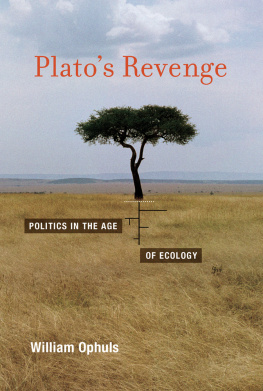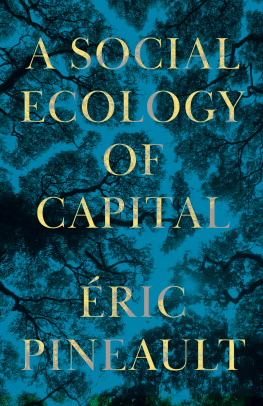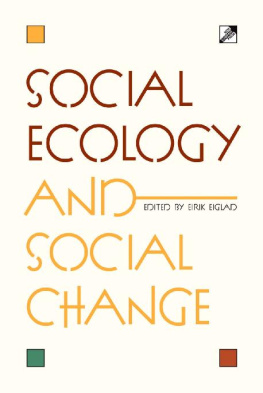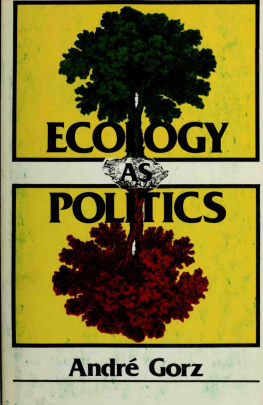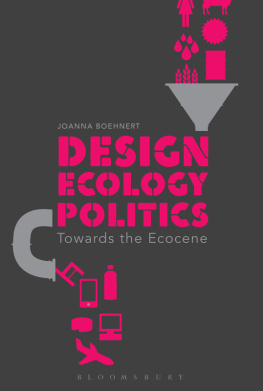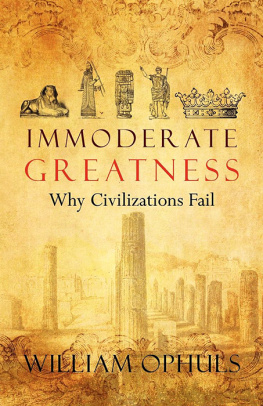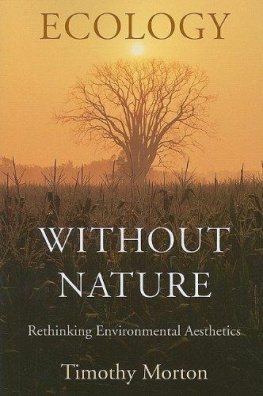Platos Revenge
Platos Revenge
Politics in the Age of Ecology
William Ophuls
The MIT Press
Cambridge, Massachusetts
London, England
2011 Massachusetts Institute of Technology
All rights reserved. No part of this book may be reproduced in any form by any electronic or mechanical means (including photocopying, recording, or information storage and retrieval) without permission in writing from the publisher.
MIT Press books may be purchased at special quantity discounts for business or sales promotional use. For information, please e-mail or write to Special Sales Department, The MIT Press, 55 Hayward Street, Cambridge, MA 02142.
This book was set in Sabon by Toppan Best-set Premedia Limited. Printed and bound in the United States of America.
Library of Congress Cataloging-in-Publication Data
Ophuls, William, 1934
Platos revenge : politics in the age of ecology / William Ophuls.
p. cm.
Includes bibliographical references and index.
ISBN 978-0-262-01590-5 (hardcover : alk. paper)
ISBN 978-0-262-29763-9 (retail e-book)
1. Environmental policy. 2. Political sciencePhilosophy. I. Title.
GE170.O65 2011
320.01'5dc22
2010053624
10 9 8 7 6 5 4 3 2 1
For Harriet, Auden, and Cyrus
Caught in the relaxing interval between one moral code and the next, an unmoored generation surrenders itself to luxury, corruption, and a restless disorder of family and morals.
Will and Ariel Durant, The Lessons of History
Preface
This book completes the task I set myself many years agoto find a humane and effective political response to the challenge of ecological scarcity. The challenge arises from an ensemble of interlocking biological, geological, and physical limits that now threatens the welfare and possibly the existence of industrial civilization.
I began in 1977 with Ecology and the Politics of Scarcity by arguing that modern political economies devoted to economic development were on a collision course with the laws of ecology, which forbid perpetual growth. The entire set of modern ideas, institutions, and practices predicated on abundance would have to be replaced by ones grounded on scarcity, which was about to reemerge with unexpected force. Whether they liked it or not, human beings would soon be obliged to renounce continual material growth and instead devise a steady-state political economy that would make it possible for humanity to live in a long-term, harmonious balance with nature.
Because the conquest of scarcity by technological means is a modern article of faith, this ecological argument was mostly dismissed out of hand on the ground that market forces and human ingenuity would ever and always vanquish material constraints. To the extent that the argument was accepted as real, it was mostly misunderstood, and the political responsefirst to frame the problem in terms of environmental concern rather than ecological peril and then to try to mitigate waste and pollution while ignoring the antiecological dynamic that created themwas therefore superficial. In short, it was business as usual, with some minor modifications intended to treat the most glaring symptoms of ecological illness.
This failure to grasp that the root of the disease is not defective public policies but a defective public philosophy motivated me to resume the discussion in 1997 with Requiem for Modern Politics. In that work, I argued that the modern political paradigmthat is, the body of political concepts and beliefs inherited from Thomas Hobbes and his successorswas bound for self-destruction even before the emergence of ecological scarcity. That paradigm is no longer intellectually tenable or practically viable because any polity that abandons virtue and rejects community necessarily becomes the author of its own demise. The tendencies toward moral decay, social breakdown, economic excess, and administrative despotism that are evident everywhere in the so-called developed world testify to the need for a new public philosophyon political as well as ecological grounds.
This book attempts to sketch the basic outline of such a philosophya natural law theory of politics grounded in ecology, physics, and psychology. In doing so, I make explicit the basic principles of ecological polity that were implicit in my previous work and add new material to make the theory more robust.
I start from the radical premise that sustainability as usually understood is an oxymoron. Industrial man has used the found wealth of the New World and the stocks of fossil hydrocarbons to create an antiecological Titanic. Making the deck chairs recyclable, feeding the boilers with biofuels, installing hybrid winches and windlasses, and every other effort to green the Titanic will ultimately fail. In the end, the ship is doomed by the laws of thermodynamics and by implacable biological and geological limits that are already beginning to bite. We shall soon be obliged to trade in the Titanic for a schoonerin other words, a postindustrial future that, however technologically sophisticated, resembles the preindustrial past in many important respects. This book attempts to envision the politics of that smaller, simpler, humbler vessel.
From this radical premise, which will not be easily accepted, follows a return to first principles. Rather than joust with contemporary specialists in environmental affairs, I therefore decided from the outset to rely on the time-tested classical authors who have eloquently and cogently grappled with the core issues of politics. I found Plato, Jean-Jacques Rousseau, and the rest more illuminating and pertinent than other writers to achieving my aimnamely, encouraging readers to question our most basic social, economic, political, and even moral assumptions as the first step toward imagining a truly ecological future.
To put it another way, I have written a provocative essay, not a scholarly treatise. The measure of my success will be its ability to challenge convention and to move the conversation beyond a misguided search for so-called sustainability and toward a deeper examination of our basic principles. Ecological scarcity is not a problem that can be solved within the old framework but a predicament or dilemma that can be resolved only by a new way of thinking. The ultimate outcome of this new philosophy will be a new political order.
My essay does not describe this new order. Nor do I prescribe a particular form of government or its precise powers. Instead, I focus on the epistemological, ontological, and ethical basis of politics and then suggest where this might lead. Nevertheless, it should be clear where my sympathies liewith a fundamentally limited, Jeffersonian, republican form of government. This is not out of mere predilection but because that seems to me to be what ecological reality demands.
But we must keep an open mind. The experience of living in different cultures has taught me that no one form of government fits all peoples and all circumstances. In the end, there is wisdom in Alexander Popes famous couplet:
For Forms of Government let fools contest;
Whateer is best administered is best.
Since good administration necessarily varies according to the prevailing conditions within a society, I have tried to frame my theory so that it can be the basis for many different kinds of political arrangements, from tribal monarchy to direct democracy.
Some may object that a radical change in public philosophy is hardly a practical or feasible solutionas if it were somehow illegitimate to propose answers to our problems that do not accord with received ideas or that cannot be implemented by existing institutions. But if our problems have been created by a certain way of thinking, then the only real solution is to adopt a new way of thinking and not to devise clever political or economic mousetraps based on the old one. As Albert Einstein is supposed to have said, No problem can be solved from the same level of consciousness that created it. And once adopted, the new level of consciousness will almost automatically generate the requisite practical measures. Why is it taboo to propose political change when we complaisantly permit massive, unlegislated technological changes that have the effect of overturning the social order? The current American political regime is not sacrosanct. If the founders could see how the Constitution that they framed with such prudence has been subverted by their political progeny, they would be appalled. The only genuine solution to our predicament is a new political philosophy, however impractical, unfeasible, or even heretical it might seem to adherents of the old one.
Next page
